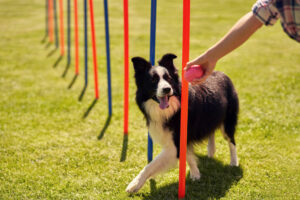When it comes to keeping our canine companions healthy and happy, one key factor to consider is their diet. Just like humans, dogs require a balanced and nutritious diet to maintain optimal fitness levels. In this article, we will explore the importance of dog fitness food and provide you with valuable insights into selecting the best options for your furry friend.
Understanding Dog Fitness Food
Dog fitness food refers to specially formulated diets that are designed to meet the nutritional needs of active and energetic dogs. These foods are typically rich in high-quality protein, healthy fats, and essential vitamins and minerals, which promote muscle development, support energy levels, and aid in overall wellness.
Key Nutrients for Dog Fitness
Protein: Protein is essential for building and repairing muscles. Look for dog fitness food that contains high-quality sources of protein such as chicken, beef, fish, or lamb. Avoid foods with excessive fillers or artificial additives.
Healthy Fats: Healthy fats, such as omega-3 and omega-6 fatty acids, are crucial for maintaining healthy skin, a shiny coat, and promoting joint health. Look for dog fitness food that includes ingredients like salmon oil, flaxseed, or chicken fat.
Complex Carbohydrates: Complex carbohydrates, such as whole grains and vegetables, provide a steady release of energy, supporting your dog’s active lifestyle. Avoid foods that primarily contain simple carbohydrates, like corn or wheat.
Vitamins and Minerals: Essential vitamins and minerals are vital for a dog’s overall health. Look for dog fitness food that includes a balance of vitamins A, C, D, E, as well as minerals like calcium, phosphorus, and zinc.
Choosing the Best Dog Fitness Food
Consider Your Dog’s Age and Size: Different life stages and sizes have varying nutritional needs. Puppies require more calories and nutrients for growth, while senior dogs may benefit from joint-supporting ingredients. Consult with your veterinarian to determine the right dog fitness food for your pooch.
Read the Ingredient List: Avoid dog fitness food that contains artificial colors, flavors, or preservatives. Opt for options with natural, wholesome ingredients.
Research Brands: Look for reputable brands that prioritize quality and safety. Read customer reviews and check for any recalls or controversies associated with the brand.
Consider Specific Dietary Needs: Some dogs may have specific dietary requirements due to allergies or sensitivities. If your dog has special needs, consult with your vet to identify suitable dog fitness food options.
Conclusion
Feeding your dog the right fitness food is an essential aspect of maintaining their overall health and well-being. By providing a balanced diet rich in high-quality protein, healthy fats, complex carbohydrates, and essential vitamins and minerals, you can ensure that your furry friend has the energy and nutrition they need to lead an active lifestyle. Remember to consult with your veterinarian to determine the best dog fitness food for your specific dog, taking into account their age, size, and any specific dietary needs they may have. With the right diet, your pooch will be on their way to a healthier and happier life.







